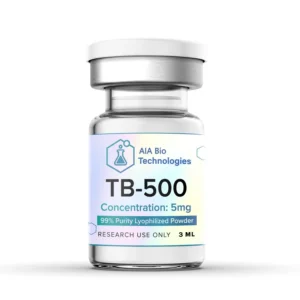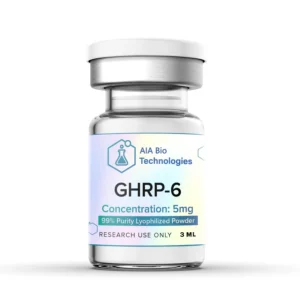IGF-1
+ Free Shipping**IGF-1** (Insulin-like Growth Factor 1) is a naturally occurring protein in the body that plays a crucial role in growth and development, particularly during childhood. It is also important for anabolic (tissue-building) processes in adults, influencing muscle growth, recovery, and cell repair. IGF-1 is primarily produced in the liver in response to signals from **growth hormone (GH)**, but it also has systemic effects, meaning it acts on various tissues throughout the body.
### **Key Features of IGF-1**:
1. **Growth and Development**:
– IGF-1 is vital for normal childhood growth. It helps promote the growth of bones, muscles, and tissues. During puberty, IGF-1 works in concert with growth hormone to stimulate linear growth (height).
2. **Muscle Growth and Repair**:
– In adults, IGF-1 plays a role in **muscle hypertrophy** (increase in muscle size) and regeneration. It stimulates **protein synthesis** and inhibits protein degradation, making it an important factor for those aiming to build muscle or recover from injury.
– Athletes and bodybuilders are often interested in IGF-1 for its potential to enhance muscle recovery and growth following workouts.
3. **Cellular Growth and Repair**:
– IGF-1 promotes the growth and development of various types of cells, including nerve cells, and aids in tissue repair. This makes it beneficial in healing wounds and recovering from injuries.
– It is also believed to have a role in **neurogenesis** (the formation of new neurons), supporting brain health and cognitive function.
4. **Fat Loss and Metabolism**:
– IGF-1 is involved in lipid metabolism, meaning it helps break down fats and convert them into energy. Higher levels of IGF-1 may support fat loss by increasing metabolic activity and promoting a leaner physique.
– It also improves insulin sensitivity, helping to regulate blood sugar levels, which can be beneficial in weight management and diabetes prevention.
5. **Anti-Aging Properties**:
– IGF-1 is sometimes linked with **anti-aging** effects because of its role in cell regeneration and tissue repair. As people age, levels of growth hormone and IGF-1 decrease, which can lead to loss of muscle mass, reduced skin elasticity, and slower healing.
– Some believe IGF-1 can help slow down or reverse certain signs of aging by supporting tissue repair and cellular growth, although more research is needed in this area.
### **How IGF-1 Works**:
IGF-1 is similar in structure to insulin and binds to specific receptors on cells to trigger growth and metabolic effects. It is primarily activated by **growth hormone**, which stimulates its production in the liver. Once released, IGF-1 acts on various tissues throughout the body to promote growth, recovery, and metabolic balance.
### **IGF-1 in Medicine**:
– **Growth Deficiencies**: IGF-1 is prescribed to children and adults who have a deficiency in this hormone, which can lead to growth failure, short stature, or metabolic issues.
– **Muscle Wasting and Recovery**: IGF-1 has been used in clinical settings to treat muscle wasting diseases, such as **muscular dystrophy** or severe cachexia (muscle loss due to chronic illness).
### **Forms of IGF-1**:
1. **IGF-1 LR3 (Long Arg3 IGF-1)**:
– A modified version of IGF-1 that has a longer half-life, allowing it to stay active in the body for a longer period. It is preferred in performance enhancement due to its extended action, which promotes greater muscle growth and recovery.
2. **IGF-1 DES**:
– A truncated form of IGF-1 that acts more potently on specific tissues. It has a much shorter half-life but can be highly effective in localized tissue growth, such as muscle hypertrophy in areas of injection.
### **Potential Benefits**:
– **Increased muscle mass** and improved recovery after physical activity.
– **Enhanced fat loss**, particularly in conjunction with exercise.
– **Improved healing** of wounds, injuries, or surgical recovery.
– Potential **anti-aging effects** due to enhanced tissue repair and regeneration.
### **Side Effects**:
Although IGF-1 is a naturally occurring hormone, synthetic or excessive use can lead to side effects, including:
– **Hypoglycemia** (low blood sugar) due to its insulin-like effects.
– **Joint pain** and **fluid retention**.
– **Organ growth** if used in excess, as IGF-1 promotes the growth of all tissues, not just muscles.
– **Cancer concerns**: Some research suggests that excessive IGF-1 levels may increase the risk of cancer due to its ability to promote cell division. More studies are needed to fully understand this risk.
### **Administration**:
IGF-1 is typically administered through **subcutaneous injection**. Dosages vary depending on the goal (medical vs. performance enhancement), and it is important that use is medically supervised, especially in non-medical contexts.
### **Conclusion**:
IGF-1 is a powerful hormone with essential roles in growth, muscle repair, and metabolism. While it offers promising benefits for muscle development, fat loss, and recovery, it should be used carefully, as improper or excessive use can lead to serious side effects. Its potential in both medical and performance enhancement contexts continues to be of great interest, particularly for its role in tissue repair and anti-aging.




Reviews
There are no reviews yet.